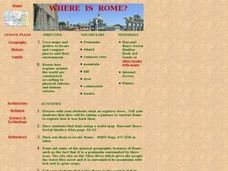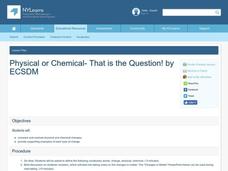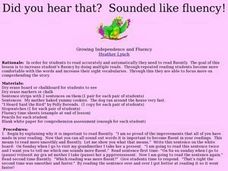Curated OER
Where is Mesoamerica?
Students create a map of Mesoamerica using construction paper, clay or by drawing it. In this World Geography activity, students determine the location of Mesoamerica, make a map, then present their map to their class.
Curated OER
My Friend's Sister is a Pole Dancer!
Eighth graders explore the workout that is provided by pole dancing. In this lesson, 8th graders read an article then complete several activities that check their comprehension of the article, such as answering questions that can be on...
Bully Free Systems
Bully Free Lesson Plans—Eighth Grade
Middle schoolers are likely very familiar with the concept of bullying and cliques. Discuss their experiences and brainstorm ways to handle peer conflict and feelings of exclusion with a poem that focuses on bullying, and a second lesson...
PBS
Stories of Painkiller Addiction: Prescription Drug Abuse Awareness Campaign
The I-STOP law was designed to regulate the distribution and tracking of prescription drugs. After reading an article about its signing and implementation, middle and high schoolers work together to come up with their own ideas for an...
EngageNY
Systems of Equations Leading to Pythagorean Triples
Find Pythagorean Triples like the ancient Babylonians. The resource presents the concept of Pythagorean Triples. It provides the system of equations the Babylonians used to calculate Pythagorean Triples more than 4,000 years ago. Pupils...
EngageNY
Exponential Decay
I just bought that car, how can its value decrease already? Individuals use the data of a depreciating car value to create an exponential decay model. They then compare exponential decay and growth equations.
Curated OER
Where Is Rome?
Third graders discover Ancient Rome through maps and worksheets. In this world history lesson, 3rd graders locate Rome on a world map and identify the scope of the Roman Empire. Students label an entire map of Italy after printing one...
Curated OER
Why Do Gasoline Prices React to Things That Have Not Happened?
Students investigate how the price of gas is determined. In this economics instructional activity, students analyze supply and demand and seasonal demand, create tables and graphs and reflect on consumer expectations.
Curated OER
Child Labor during the Industrial Revolution and Now
Fifth graders research topic of child labor by studying Industrial Revolution, read about child labor laws, and examine countries where child labor still exists today. They then choose single question to research from list, and create...
Concordia University Chicago
The Cradle by Berthe Morisot
The art activities found here have learners take a critical look at the role of women in the domestic setting. They analyze Berthe Morisot's The Cradle through a guided discussion. Then they paint men and women in traditional domestic...
Curated OER
50 Cent- "Get Rich or Die Tryin"
In this popular culture reading comprehension worksheet, young scholars read a detailed biography of rapper 50 Cent. Students answer 5 comprehension questions. Note: This is a high interest article with photographs, but contains details...
Curated OER
Volleyball - Lesson 4 - Setting Up to Attack
Volleyball - Lesson 4 covers the skill of chasing an errant volleyball pass and putting it back into the proper playing area. This is done by chasing down the ball and using a reverse forearm pass. This takes a lot of practice to get...
BW Walch
Unexpected Family History
The history of the northern states' involvement in the slave trade is not widely known. This resource uses the PBS documentary, Traces of the Trade, and the nonfiction book, Children of the New England Slave Trade, to examine this aspect...
American Physiological Society
Sit On It
How do product designers come up with the variety of things we see in stores and on TV every day? They identify a need, then create something that meets that need. Sounds simple, right? A two-week lesson puts seventh graders in that role...
Centers for Ocean Sciences
Ocean and Great Lakes Literacy: Principle 7
Your mission, should you choose to accept it, is to take your class on an underwater adventure. The final installment in a seven-part series involving salt and freshwater bodies takes junior oceanographers below the surface in...
University of Pennsylvania
Decoding Propaganda: J’Accuse…! vs. J’Accuse…!
Reading snail mail is a great way to go back into history and to understand others' points of view. The resource, the second in a five-part unit, covers the Dreyfus Affair. Scholars, working in two different groups, read one letter and...
Anti-Defamation League
Women's Suffrage, Racism, and Intersectionality
The Nineteenth Amendment granted women the right to vote—as long as they were white. High schoolers read articles and essays about racism in the suffrage movement and consider how intersectionality played a role in the movement. Scholars...
Curated OER
All You Need Is Love
Students discuss the differences between adult love and teenage love. After reading an article, they explore a relationship that began as teenagers and ended in marriage later in life. In groups, they create posters about famous...
Curated OER
X Is For Wonderment
Students engage in a lesson that is concerned with the "X" chromosome and how ti is part of genetics with the use of Punnett squares. They use this tool in order to predict future genetic outcomes while focusing upon specific questions.
Curated OER
Who is the Expert? Exploring Credible Sources in Healthcare
How do you decide what sources are credible when researching online? Evaluate sources with a focus on researching health issues. After brainstorming common health concerns and how they would try to diagnose these problems, class members...
Curated OER
Physical or Chemical- That is the Question!
Students observe the differences between physical and chemical changes in properties. Through the use of an interactive presentation, the students compare and contrast the changes and provide supporting examples of each type of change.
Curated OER
What Is the History of the Consumption of Rice?
Sixth graders research the history of rice consumption. In this rice consumption lesson, 6th graders read a study guide and answer comprehension questions about two rice dishes and rice cultivation.
Curated OER
Did You Hear That? Sounded Like Fluency!
Learners work to improve their reading fluency. With a partner, they read sentence strips and reread them to make the sentence more fluent and meaningful. Then, with a partner, they read and reread stories together and track their...
Curated OER
The Worldwide Depression was Caused by a C.R.A.S.H.
In this Great Depression of the 1930's study guide worksheet, students read a brief overview pertaining to the time period in world history and then respond to 4 reflection questions.

























